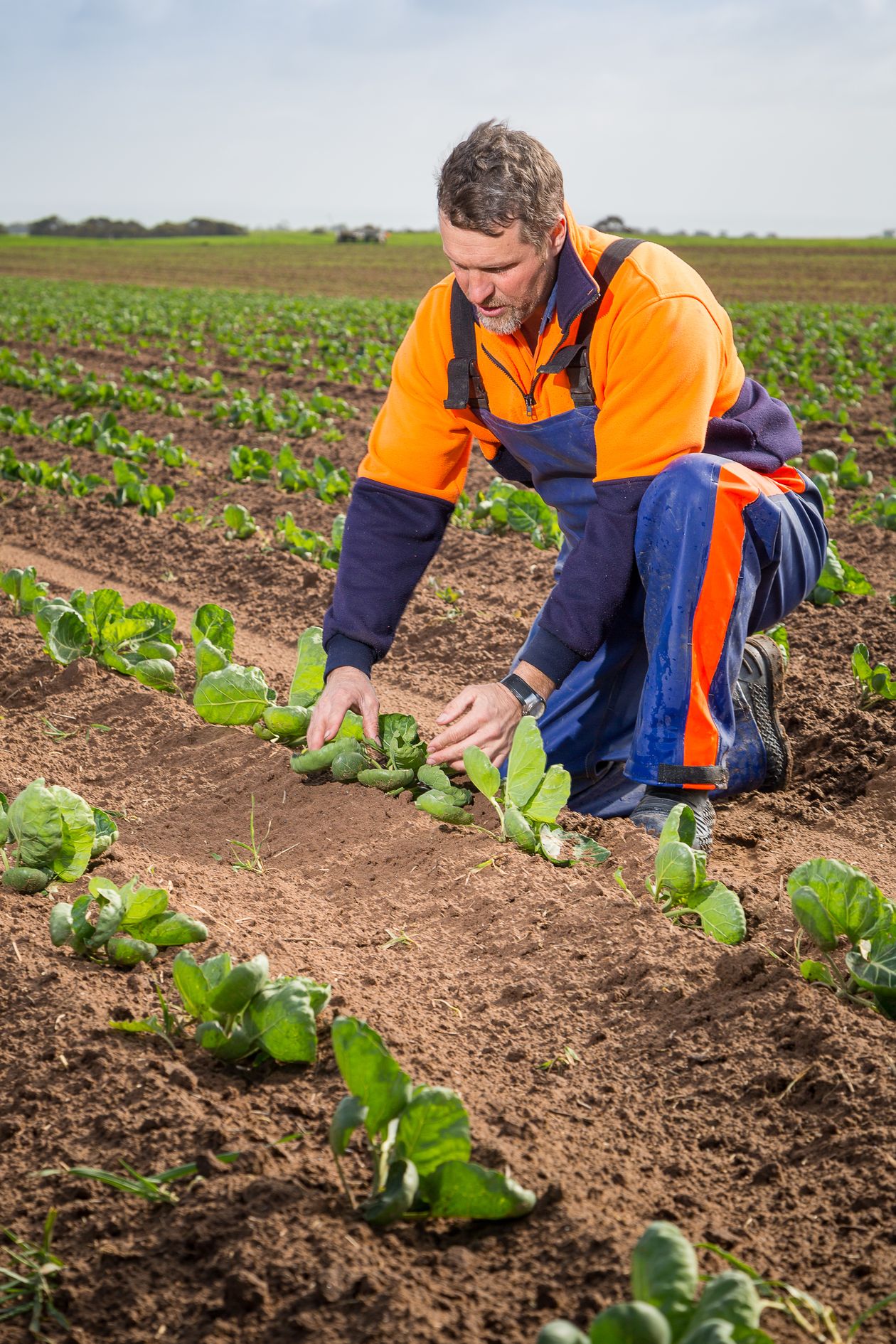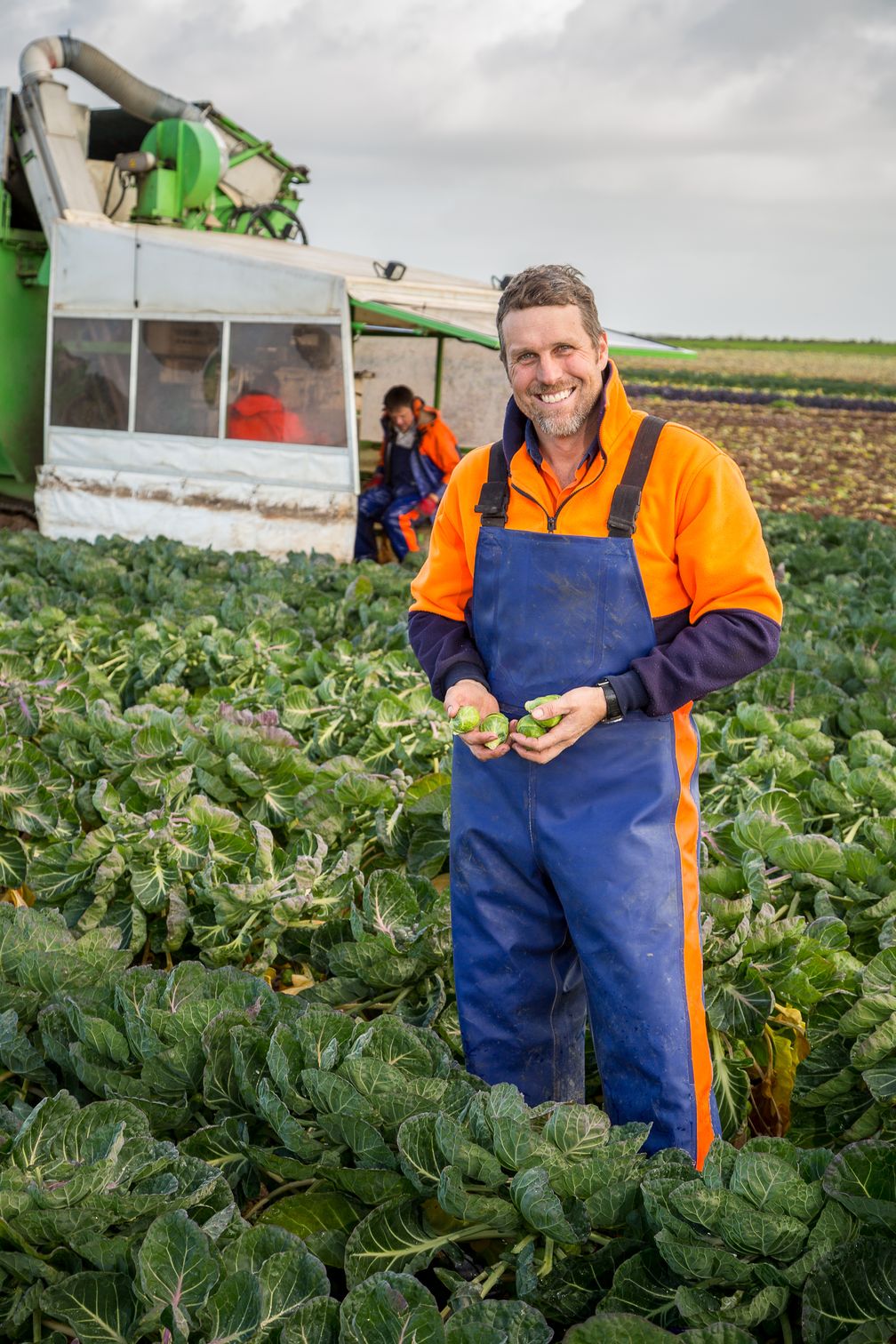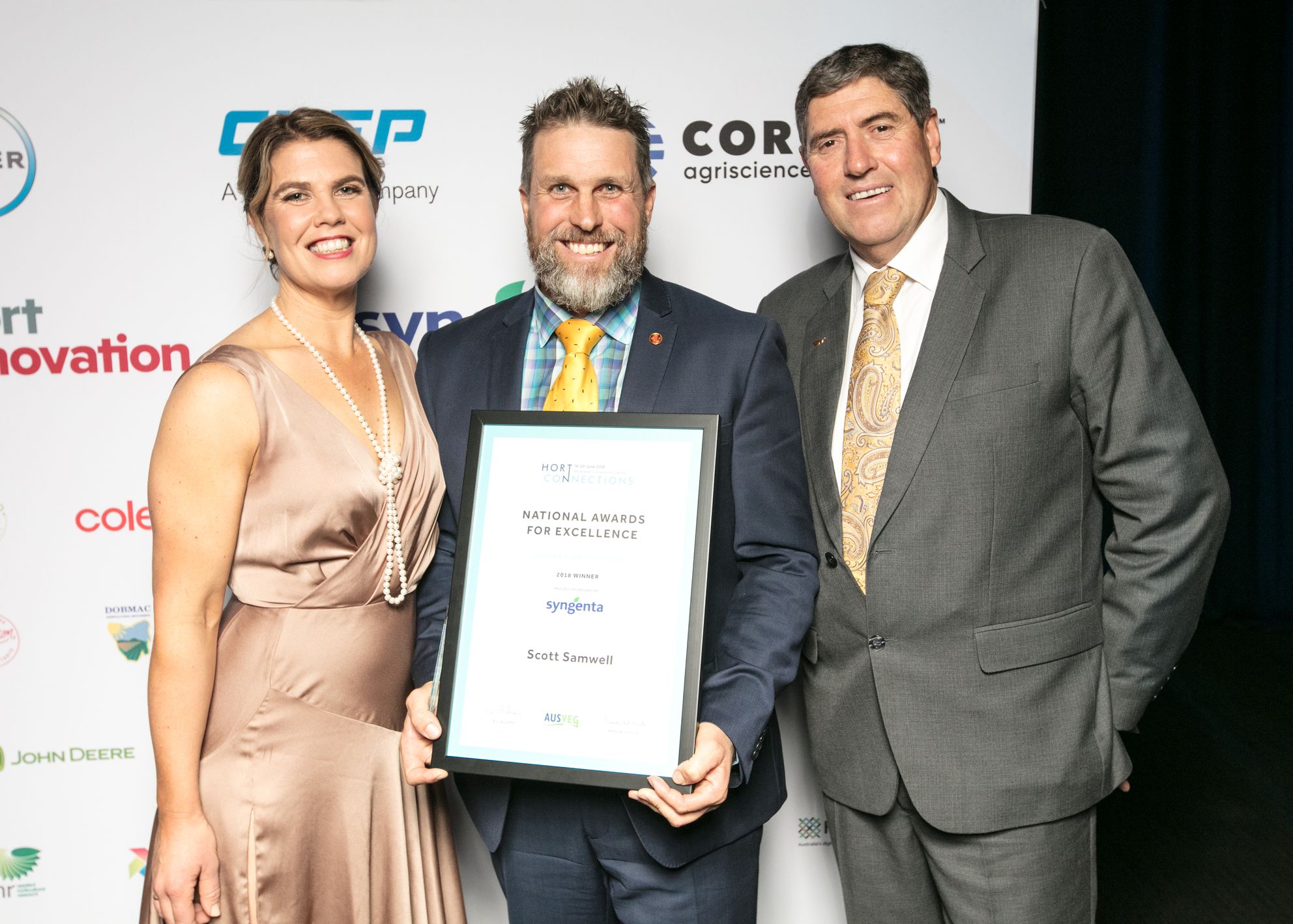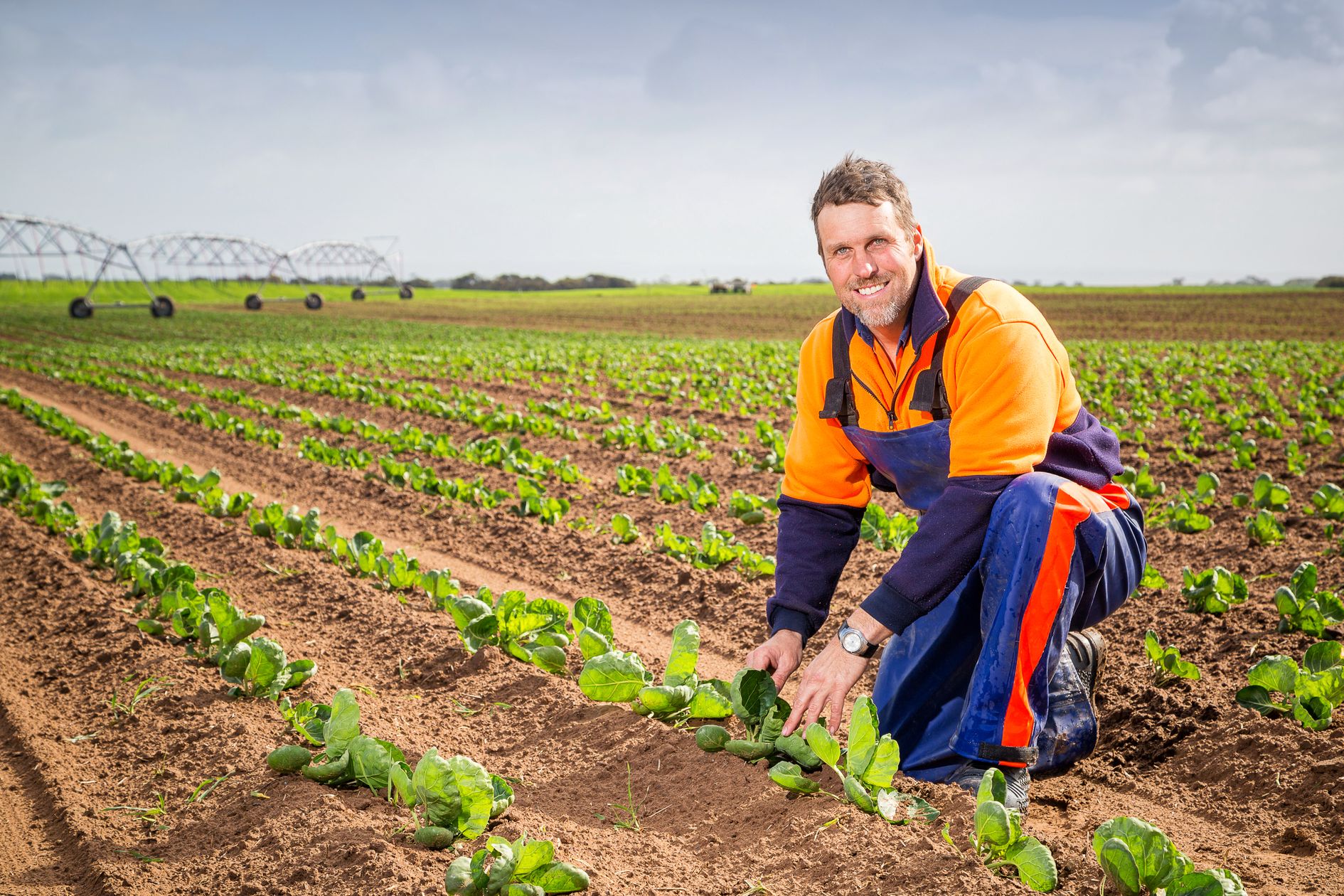Scott Samwell: Sowing the seeds for sprout success
South Australian vegetable grower Scott Samwell is always open to innovation and change to improve his business, including a fortuitous meeting during his Nuffield Scholarship that led to the successful launch of a new vegetable line, Kalettes, in 2011.
Fast facts
Name: Scott Samwell
Location: Mount Barker, SA
Works: Eastbrook Vegetable Farms
Grows: Brussels sprouts, Kalettes
For over 20 years, third generation vegetable grower Scott Samwell has been working incessantly on the family farm to perfect the art of Brussels sprout production.
Eastbrook Vegetable Farms is located at Mount Barker, 35 kilometres south-east of Adelaide, and is one of South Australia’s largest Brussels sprout growing operations, for both green and red varieties. In addition, it is the birthplace of the Kalette, which is a cross between kale and Brussels sprouts.
Scott grew up on the family farm and was encouraged to get a qualification so he could be involved in the business. He studied a Bachelor of Applied Science at the University of Adelaide before returning home to the farm in 1996.
Now Eastbrook Vegetable Farms Managing Director, Scott’s role encompasses everything outside of the packing shed. From planting and harvesting schedules to pest control and irrigation, as well as quality assurance, Scott handles it all.
“I love being out in the fields, and I love being in the soil. I love the growing and the satisfaction in growing the crop: you plant it, you nurture it, you protect it, you irrigate it, you fertilise it; you do whatever you can to maximise its potential so that you hopefully harvest a beautiful clean crop which is going to be great for your local community and for those around the nation who eat our products,” he says.
Scott’s dedication to vegetable growing and his enthusiasm for the industry earned him the Grower of the Year accolade, sponsored by Syngenta, at the Hort Connections 2018 National Awards for Excellence Gala Dinner on 20 June.


Education is key
Over the past 20 years, Scott has travelled the world in search of innovative ideas for Brussels sprout production. As the farm originally harvested its Brussels sprouts by hand, Scott moved to The Netherlands for four months to gain a better understanding of mechanical harvesting and how he needed to plant the crops to suit this process.
Scott’s learning continued when he received a Nuffield Scholarship in 2012, as part of a strategic levy investment under the Hort Innovation Vegetable Fund. The scholarship allowed Scott to travel to California and the mid-west of the United States as well as Belgium, France, Germany, the Netherlands and the United Kingdom, where he looked at farming practices (particularly in terms of maintaining soil health) and ways to improve Brussels sprout production.
“Coming back to Australia, it was nice to see how our business stacked up against others. In some areas, there was room for improvement in efficiency and there were other areas that we were doing really well,” Scott says.
“It was a great experience to see that we all have similar challenges; whether we’re here in Australia, in China, in Europe or America – labour costs keep going up, input costs are going up and often the returns aren’t matching those increases. Everyone is facing the same challenges and it’s how you go about minimising that gap between cost and return.”
"I love being out in the fields, and I love being in the soil. I love the growing and the satisfaction in growing the crop: you plant it, you nurture it, you protect it, you irrigate it, you fertilise it; you do whatever you can to maximise its potential so that you hopefully harvest a beautiful clean crop which is going to be great for your local community and for those around the nation who eat our product."
Product development
In October 2011, Scott planted 60 seeds of a product which had never been grown in Australia – Kalettes. He admits he didn’t know what to expect from the trial until, by chance, he saw them at mature growth in Wisconsin in the United States while on the Nuffield study tour the following year.
“Now we’re planting close to 200,000 seeds a season. Further innovation is needed for more varieties which I’m hoping will extend the season,” Scott says.
Eastbrook Vegetable Farms then teamed up with Coles to launch the Kalettes brand and send the product to market.
“Coles was really excited because they could see the new innovation and a completely new vegetable. It was a matter of putting it into the stores and testing it, and it’s gone reasonably well,” Scott says.
“We’ve built on the success of each previous year to the point where we have annual production. We’ll certainly keep working on it – it’s more about getting the message out about it, which Coles is really good at.”
Scott encourages other growers with a new product or idea to consider teaming up with retailers that are interested in their innovations. However, he warns not to get disheartened by the hurdles that will inevitably be faced along the way.
“We’ve had good success and we’ve had some failures as well. That, I think, is the challenge in launching something new – you’re going to get some good years, then you’re going to get some failures as well, and then you find your feet and find the market.”

Industry dedication
Scott is always eager to be involved in vegetable industry activities, whether it’s the Soil Wealth ICP project (now in its second phase) or as a member of the Consumer Alignment Strategic Investment Advisory Panel, which allows him to be a voice for growers on issues such as increasing vegetable consumption among Australians.
During phase one of the Soil Wealth project, a strategic levy investment under the Hort Innovation Vegetable Fund, Scott hosted a trial site and field walks on his property where he shared what he’d learnt about the use of beneficial species, soil health and cover crops.
“I think it’s a great way for growers to learn by visiting other growers and seeing their operation. It’s also really important to share the success stories and also the failures so that you can learn from them; and it’s a great forum to be able to bounce ideas off each other and share what’s working and what’s not,” he says.
Scott’s future plans for the business include a reduction of pest and disease issues in the field to increase product pack-out as well as cementing Kalettes onto the palette of Australian consumers. He also has an eye on the fourth generation taking over Eastbrook Vegetable Farms in years to come.
“I certainly want to keep on improving the business. I have three daughters and my brother has four sons, and there are a lot more opportunities for both genders to be involved in the business if they choose to,” Scott says.
Put simply, Scott loves being a vegetable grower and was honoured to receive the Grower of the Year award. He also credits his success to his family including his wife Rochelle, father Kent, uncle Leigh, brother Luke and sister-in-law Deborah, along with cousin James as well as other employees on the farm.
“It’s something special – you can’t get much higher than that. To be mentioned among the likes of Belinda Adams, Matt Hood, Rob Hinrichsen and Anthony Staatz is a privilege – I look up to them. They’ve done a great job in their business with everything that they do, and to be linked to that group is an honour.”
This grower profile first appeared in the leading magazine for the Australian vegetable industry, Vegetables Australia. If you’d like to subscribe to receive a new edition of Vegetables Australia in your mailbox every two months, use our online subscription form!
Photography credit: asbCreative

